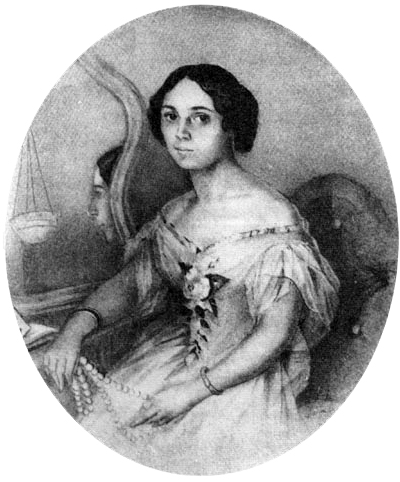Elena Denisieva With Her Daughter Elena; Only About Three Years After This Photograph Was Made, Both of Them Were Dead
Федор Тютчев
(1803-1873)
Накануне
годовщины 4 августа 1864 г.
Вот
бреду я вдоль большой дороги
В тихом свете гаснущего дня…
Тяжело мне, замирают ноги…
Друг мой милый, видишь ли меня?
Все темней, темнее над землею —
Улетел последний отблеск дня…
Вот тот мир, где жили мы с тобою,
Ангел мой, ты видишь ли меня?
Завтра день молитвы и печали,
Завтра память рокового дня…
Ангел мой, где б души ни витали,
Ангел мой, ты видишь ли меня?
August 3, 1865
d
Literal
Translation
On
the Eve of the Anniversary of August 4, 1864
Now I wander along the highroad
In the quiet light of the
expiring day . . .
I feel bad, my legs feel rooted
to the spot . . .
My dear friend, do you see me?
All is growing darker, darker
over the earth –
The last reflection of the day
has flown off . . .
Here is that world where you and
I lived,
My angel, do you see me?
Tomorrow is a day of prayer and
sorrow,
Tomorrow is the memory of that
fatal day . . .
My angel, wherever your soul
might be hovering,
My angel, do you see me?
d
Literary
Translation/Adaptation by U.R. Bowie
On the Eve of the Anniversary of August 4, 1864
In quiet light of day as daylight
dies . . .
So sick at heart, my legs can hardly
bear me . . .
My dear friend, do you see me,
hear my sighs?
Darker grows the dimness, and sheer dark envelops earth—
The final glint of
daylight just flew off to some elsewhere . . .
This is the
world where you and I once lived with joy and mirth,
My angel, do you
see me, are you there?
Tomorrow is a
day of prayer and grieving,
Tomorrow is the
memory of that fatal, dreadful day . . .
My angel, is
your soul still there, awake, or unperceiving,
My angel, can
you see my anguish, my dismay?
d
Translator’s Note
(From Wikipedia)
The poem
above is dated August 3, 1865, exactly—as the title reveals—a year and a day
before the anniversary of Elena Denisieva’s death. In 1850 Tyutchev began an
illicit affair with Denisieva (1826-1864), who was over twenty years younger
than him. She remained his mistress until her death from TB in 1864, bearing
him three children, two of whom died within less than a year after their
mother’s death, also of tuberculosis. After the children’s death in May, 1865,
the poet wrote as follows in a letter: “I began not a single day without a
certain sense of amazement, the way a person continues to go on living,
although his heart has been ripped out and his head cut off.”
Tyutchev’s
love poems that came out of the affair, the so-called “Denisieva Cycle,” are
considered among the finest love lyrics in the Russian language.


No comments:
Post a Comment